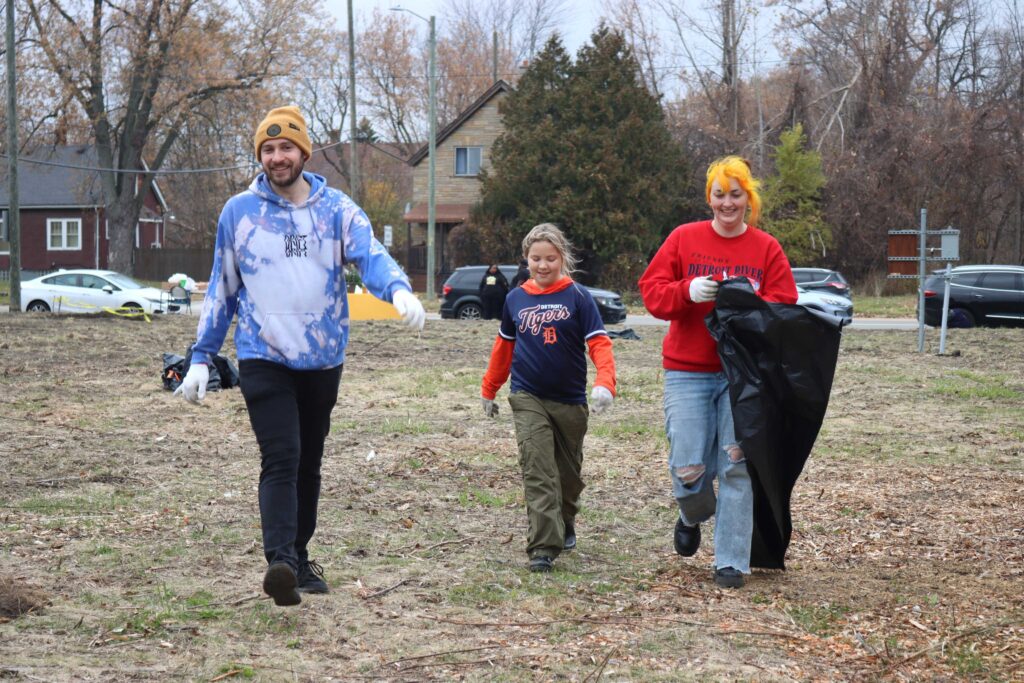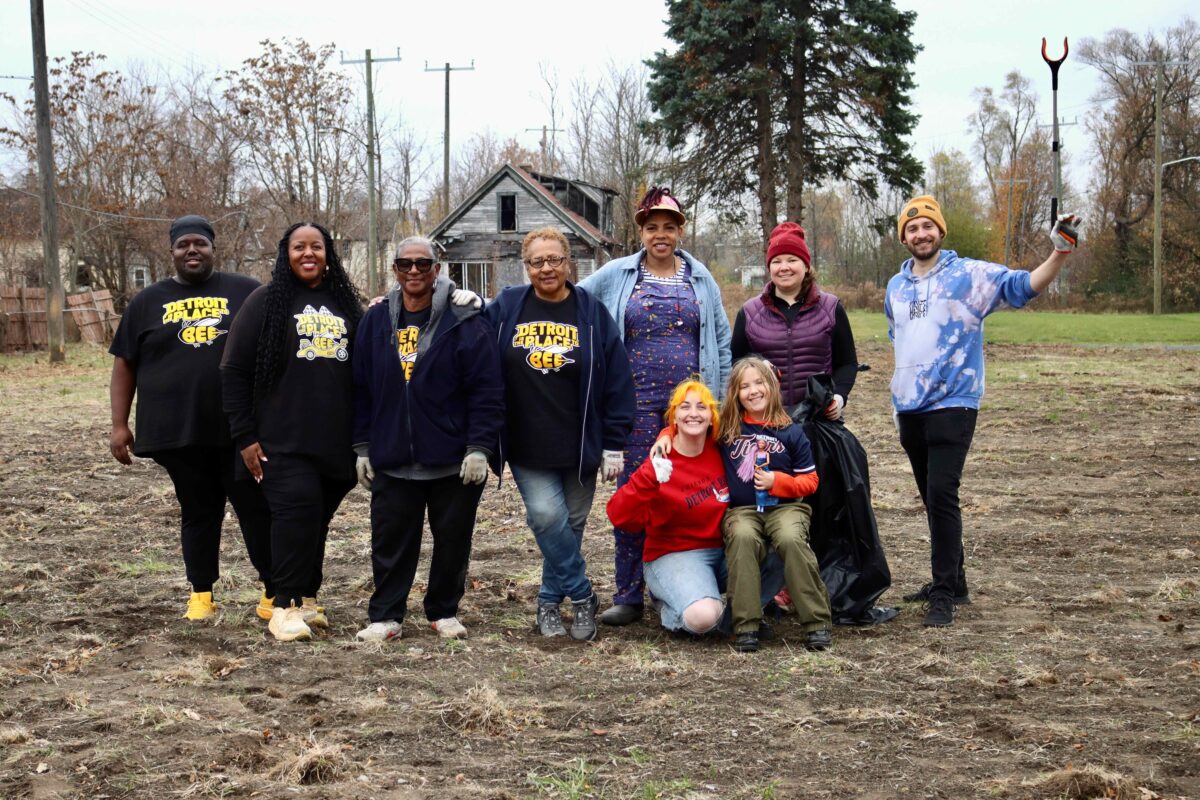Overview:
- A community arboretum and botanical garden in the works on Detroit's east side aims to "support people and pollinators in the East Warren/Cadieux community," says Timothy Jackson, co-executive director of Detroit Hives.
- Volunteers organized by Detroit Hives and Earthday.org helped clean up the property Saturday.
- Earth Day's Evan Raskin says plastic pollution needs to be addressed by Michigan lawmakers.
A vacant East Warren Avenue property is transforming into an arboretum and botanical garden with the help of volunteers.
Detroit Hives and Earthday.org partnered Saturday to clean up lots where organizers envision wildflowers, native Michigan trees, walking paths, educational signage, and space for community events and programming.
Detroit is becoming a destination as a tree city, bird city, bee city, and design city, and the East Warren Community Arboretum & Botanical Garden project aligns with all four, said Timothy Jackson, co-executive director of the nonprofit Detroit Hives. The group creates safe homes for bee colonies, a critical part of the ecosystem.
Detroit became an official Bee City USA affiliate in 2024 with the help of Detroit Hives, which launched in 2017 and has 37 locations in Michigan, Jackson said.
The aim is to complete the East Warren Avenue project, which spans six lots, by October 2026, he told Planet Detroit.
“It’s a community-reflected project that will feature an arboretum and botanical garden to support people and pollinators in the East Warren/Cadieux community,” Jackson said.
How bees, trees benefit Detroit
The site of the future East Warren Community Arboretum & Botanical Garden project, near McClellan Avenue, was originally three parcels that were home to the East Warren Apiary, where Detroit Hives gave thousands of tours to educate youth on pollinator conservation, Jackson said.
The group has since acquired additional lots at the site, and the organization has grown in scope beyond the transformation of vacant lots into bee farms.

The future site of the East Warren Community Arboretum & Botanical Garden project. Photo by Latia Leonard for Planet Detroit.
Detroit Hives is seeking volunteers and in-kind and monetary donations for the project, he said, adding that those who are interested can learn more on the nonprofit’s website.
Detroit Hives is planning another volunteer day this month in partnership with Penn State’s alternative break program, which gives students returning home for the Thanksgiving holiday volunteer opportunities during the break.
Improving vacant lots has multiple positive effects on the city, Jackson said, such as the beautification that comes with having more pollinator spaces; strengthening of community ties; and support of economic mobility.
When vacant lots are turned into green spaces like botanical gardens, “we’re able to work with local contractors, businesses, and landscape companies to employ people in the community,” he said.
Saturday’s cleanup was “extremely successful,” Jackson said. The participants included community organizations like Friends of the Detroit River and the planned Alchemy Village urban farm, as well as city representatives, Jackson said.
“It shows they believe in our mission,” he said. “We can’t do it by ourselves.”

Earth Day organizers tackle plastic problem at state Capitol
The debris cleaned up Saturday included mattresses, tractor tires, a cell phone, engine parts, “lots” of plastic bags and bottles, and single-use takeout materials, said Evan Raskin, national campaign manager for Washington, D.C.-based Earthday.org.
While in Michigan, Raskin addressed the issue of plastic pollution from a policy standpoint as well, with a visit to Lansing.
Earthday.org is lobbying for a repeal of a Michigan law that bans municipal plastic bag bans, as well as legislation that would mandate microplastics research and monitoring in the Great Lakes and drinking water.
In October, Planet Detroit reported that Detroit City Council unanimously backed a resolution in favor of repealing the Michigan law that forbids local jurisdictions from regulating plastic packaging.
In March, State Rep. Morgan Foreman (D-Pittsfield Township) and State Sen. Sue Shink (D-Northfield Township) introduced HB 4299 and SB 195 to overturn the “ban on bans.”
The litter on Detroit’s east side and state law are directly connected, Raskin said, giving the example of a resident who said plastic bags have clogged storm drains and led to flooding in their community.
“When local governments aren’t able to create a set of policies that reflect plastic pollution within their own communities, then that limits the effectiveness of cleanups like the one that we held last Saturday,” he said.
“When we don’t have local policies in place, we have to keep cleaning up the same sites over and over again.”
🗳️ What’s next? Tips for civic action
Why it matters
⚡ Earth Day’s national campaign manager says Michigan lawmakers can help address the plastic pollution in our communities.
Who’s making civic decisions
🏛️ Legislation has been introduced in the Michigan House and Senate to repeal the state’s ban-on-bans for plastic bags and to monitor microplastics. Earthday.org‘s Evan Raskin says the legislation would directly impact the plastic litter seen on Detroit’s streets.
How to take civic action now
- 🌱 Follow community groups like Detroit Hives, which is seeking volunteers.
- 📩 Call or email your state representative or state senator.
- 📣 Ask your elected officials if they plan to support legislation to overturn Michigan’s ban on municipal plastic bag bans.
What to watch for next
🗓️ Votes by the Michigan Legislature on a repeal of the state’s ban-on-bans for plastic bags.
Civic impact
🌍 Engaging in this issue could help shape how waste is regulated and whether cities have the power to manage plastic differently.
⭐ Please let us know what action you took or if you have any additional questions. Please send a quick email to connect@planetdetroit.org.
MORE COMMUNITY NEWS FROM PLANET DETROIT
Community embraces Ralph Wilson Park, Detroit riverfront’s $80 million addition: ‘Come on down’
As the sun set on the Detroit River Friday, Rex Powell enjoyed it from a bench at the Ralph C. Wilson Jr. Centennial Park. It’s his third time visiting since the 22-acre park opened Oct. 25. Powell, who lives in Lincoln Park and is retired, said he’d make the 12-mile journey to the park on…
Detroit’s Eden Park: A $21 million bet on health, wellness in polluted community
In Detroit’s 48217 ZIP code, the $21 million Eden Park Community Project aims to transform a 6-acre lot into a hub for health and wellness. The vision includes a Montessori school, community garden, amphitheater, and a secure area for Alzheimer’s patients and caretakers.
How Detroit bee populations are reviving vacant lots — and fighting climate change
How Detroit Hives is helping Detroit fight climate change through pollination.





